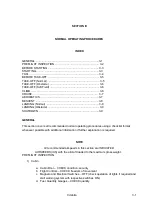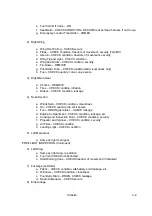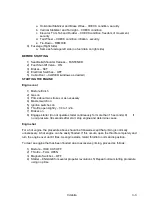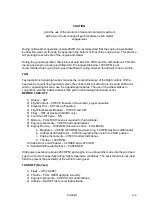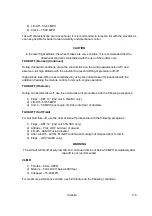
Citabria
5-2
2) Full oil capacity can be assumed for all flights. For ease of future loading computations,
the new “Empty Weight and Moment with Oil” should be determined and entered in the
Sample Loading Problem under “Your Airplane”.
3) Using the Loading Graph, Figure 5-2, determine the weight and the moment of the
following items and enter these figures on the Sample Loading Problem.
a. Pilot
b. Rear Passenger
c. Wing Fuel - 35 Gals. Maximum Usable (6 Lbs/Gal)
d. Baggage - 100 Lbs. Maximum (Normal Category Only)
4)
Add the “Aircraft Empty Weight and Moment with Oil” and all the items, in Step 3 to
determine the “Gross Take-Off Weight and Moment” .
5) Using the Flight Envelope, Figures 5-3 5-4, 5-5 for the model Citabria used, determine
that the gross take-off weight and moment are within limits.
WARNING
If the aircraft is not within the approved flight envelope
limits, it must be reloaded. Under no
circumstances should the aircraft be flown with
an out of limits condition particularly if aerobatic
flight is contemplated.
SAMPLE LOADING PROBLEM
SAMPLE LOADING PROBLEM
SAMPLE
AIRPLANE
YOUR AIRPLANE
ITEM
ARM
(in)
WEIGHT
(lbs)
MOMENT
(in-lbs)
WEIGHT
(lbs)
MOMENT
(in-Ibs)
Licensed Empty Weight
12.2
1153
14067
Oil-8 qts @7.5 lbs/gals
7ECA -6 qts
-360
+15
(+11*)
-540
(396*)
+15
(+11*)
-540
(396*)
Summary of Contents for Citabria Explorer 7ECA
Page 1: ......
Page 32: ...Citabria 5 4...
Page 33: ...Citabria 5 5...
Page 34: ...Citabria 5 6...
Page 37: ...Citabria 6 3 FIGURE 6 1 AIRCRAFT SPECIFICATIONS...
Page 38: ...Citabria 6 4...


